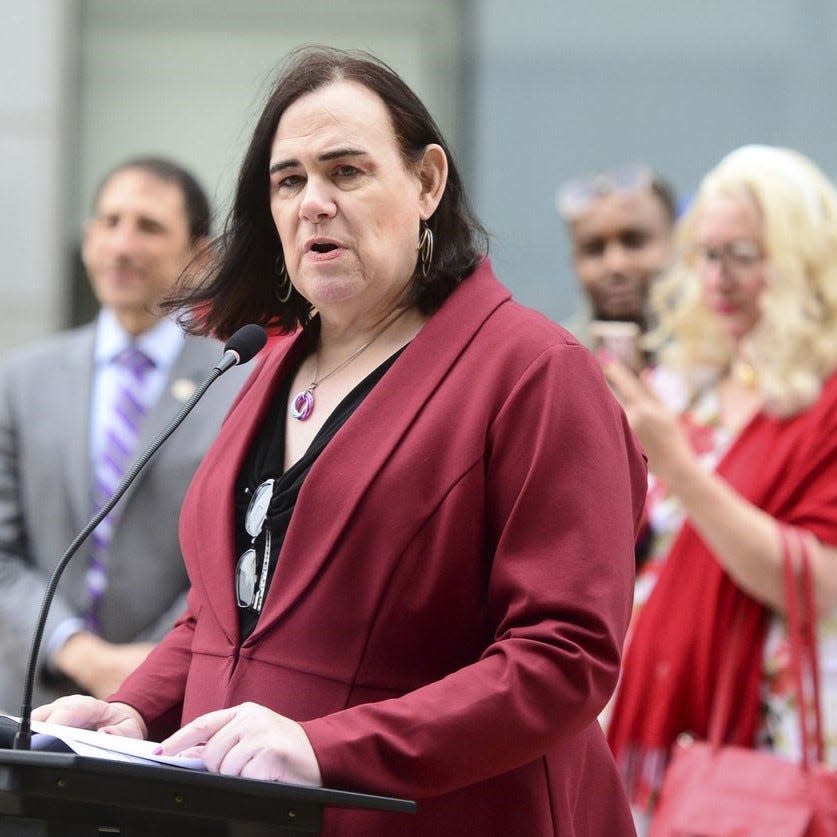Transgender Pennsylvanians struggle through the state's name change rules
It’s been over a year since Tioga County resident Scarlett Davis legally changed her name, and she’s still finding old documents that need updating.
Davis, 48, changed her driver’s license and Social Security information soon after a judge granted her petition, but some are forms she doesn’t typically use or ones that don’t seem to have any way to change them.
“A lot of people have told me that it's easier to actually get divorced and then remarried with your new name than it is to get a name change done,” Davis said. “I have called our courthouse multiple times, and they just don't have a process for changing a name in a marriage license.”
A legal name change is inherently complicated, but the fees and complexities of the process in the commonwealth keeps tens of thousands of transgender and nonbinary Pennsylvanians like Davis from starting or finishing what can be a crucial step in their transition.
In 2015, a survey by the National Center for Transgender Equality estimated that nearly 70% of transgender Pennsylvanians surveyed had not legally changed their names or gender.
Corinne Goodwin, head of the Eastern PA Trans Equity Project (EPTEP) based in Lehigh County, said a package of bills introduced earlier this year by nine Democratic state senators could help solve that problem.
“They’ll revolutionize the process in Pennsylvania and make it much easier and much safer, in particular for transgender people, not only to change their name but to be able to obtain and use legal identification that's in their chosen name and in the gender that they identify with,” Goodwin said.

EPTEP is a nonprofit group that has helped hundreds of clients navigate a name change over the past few years.
A second attempt at reform introduced in 2021, the bills include removing gender markers from birth certificates, cutting advertising requirements and creating a state grant program offering financial assistance to individuals.
State Sen. Timothy Kearney (D-Delaware), the prime sponsor of the birth certificate and the grant bills, said the reform package is “long overdue” in Pennsylvania.
“We're basically the only state left in the northeastern part of the country that doesn't rank at least medium in terms of policy for LGBTQ individuals,” Kearney said in June.
The state Democrat-led House passed its House Bill 300, the PA Fairness Act, prohibiting discrimination based on sexual orientation or gender identity in a 102-98 vote in May.
About half the states in the nation already have similar protections codified, and Pennsylvania’s law still has to make it through a Republican-controlled Senate before it lands on Democrat Gov. Josh Shapiro’s desk.
HB 300 has been in the Senate’s State Government Committee since May 3, and Kearney said he remains “hopeful” the bill will come up for a vote.
Kearney said a “culture war” over trans rights and the LGBTQ community in general have made passing bills like HB 300 and the reform package an uphill battle. Kearney said none of the name change bills had even a committee hearing last session.
“I've heard people say, ‘Why can't they be happy with the way God made them?’ That kind of latent bigotry is hard to overcome sometimes,” Kearney said, referring to messages of opposition against HB 300 he had received.
A ‘very funny’ state for trans rights
Davis, a six-year Navy veteran and resident of Wellsboro, said she’s not surprised that bills protecting LGBTQ people move slowly, if at all, in the commonwealth.
“Pennsylvania has always been a very funny state when it comes to the trans community. It's been very middle of the road … It won't commit to the safety of trans people, but yet it doesn't really pass any legislation against us either,” said Davis, who completed her legal name change last April.
Davis is among the many EPTEP clients who didn’t receive a waiver to advertise her name change.
The steps in getting a name change can vary from county to county, but one of the early requirements is publishing a public notice of the court hearing in two newspapers.

Wellsboro is a small, rural town where “everybody knows everybody,” so Davis said her transition was “very much in the eye of my whole town,” but that didn’t make the public notice feel like less of an invasion of privacy.
“When you have to, you know, kind of put yourself out there and publicly announce, ‘Hi, I'm transgender and I'm changing my name,’ it can be rather frightening because it feels like you're basically painting a target on your back,” Davis said.
Wellsboro only has one newspaper, which meant Davis also had to advertise her name change in a law review that was published far beyond the town of 3,458 people.
Senate Bill 528, introduced by Sen. Katie Muth of the 44th District, would waive the publication requirement for a transgender person’s petition and keep the name change under seal to be opened only by a court order once granted.
Goodwin said a lot of people in the LGTBQ community have justified safety concerns over publicly advertising their gender status. Transgender people are four times more likely to be the victim of violent assault in America.
The criteria for a waiver comes down to a judge’s decision and EPTEP has been “highly successful” with clients in some counties while clients in other counties are almost never granted a waiver, Goodwin said.
“In one case, a client had a police report stating they had previously been physically attacked because of their gender identity — they were still denied a waiver,” Goodwin added.
Brenig Ghorm, a trans man from Northampton County who changed his name in October, was able to get a waiver, though he said the judge was skeptical at first.
“Finally, the judge asked me: ‘Have you ever actually been threatened?’ And I had to tell him, ‘Yes, I have. I have had my life threatened because I am a trans person,’” Ghorm said.
“I got the approval, but that was humiliating … truly, truly humiliating to essentially have to beg for my life from this person who has no pertinent understanding of my experience,” he added.
The rest of Ghorm’s name change didn’t include similar confrontations, but it wasn’t without complications.
‘Are you sure? Because …’
After the judge ordered his publication waiver, Ghorm’s next step was to take forms from that judge to the prothonotary's office for filing. After that, he would then need to take a copy across the hall to the recorder of deeds, according to step-by-step instructions for Northampton County on EPTEP’s website.
But when Ghorm handed the papers off to the prothonotary’s office, a clerk there said they would send a copy to the recorder of deeds.
“I paused. I was like, ‘Are you sure? Because I was told that I need to bring this to you guys, but then I need to bring this across the hall,’ and they're like, ‘No, we take care of that,’” Ghorm recalled.

Sure enough, his Oct. 4 morning hearing was pushed back to the afternoon as he and his partner rushed to get the paperwork to the proper offices.
Ghorm doesn’t believe the error was intentional because he is transgender. The problem, according to Ghorm, Goodwin and lawmakers, is that the process is simply too confusing for even the courts to follow.
In addition to helping clients like Ghorm and Davis, EPTEP has also helped to train judges on LGBTQ issues as well as the name change process itself.
“Believe it or not,” Goodwin said, “many, many, many judges don't understand the law when it comes to name change processes.”
Senate Bill 530, introduced by state Sen. Amanda Cappelletti (Delaware and Montgomery), would reform the entire name change procedure into an administrative process that would only require the courts in specific situations, including if a parent objected to the name change of a minor child.
Another bill by state Sen. Lindsay Williams (D-Allegheny), SB 526, would require the Pennsylvania Human Relations Commission to provide a central hub of information on the name change process across the state, people to provide assistance to trans individuals seeking a name change and training for staff, judges and administrators.
An anti-discrimination bill like HB 300 is a win for people like Goodwin, Davis and Ghorm, but the three agree that legislative packages like this name change reform are just as important in a fight for equality and acceptance.
“I think HB 300 is important to really codify rights for transgender people as human beings that deserve protection from discrimination but the name change process … that set of bills is going to really make people pick and choose which side they want to be on,” Davis said.
This article originally appeared on Bucks County Courier Times: PA name change process a barrier to trans people, reform could help

